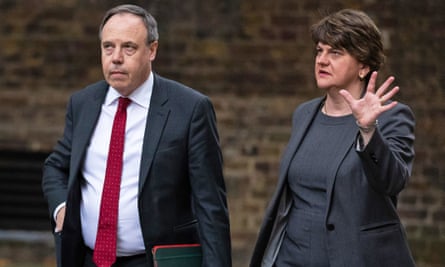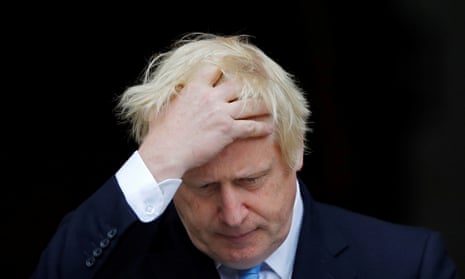In schlock horror movies there is a moment when the monster, assailed by every weapon and presumed dead, lurches back to life. And so Theresa May’s Brexit withdrawal agreement comes crawling from behind the closed doors of parliament, where it was killed at least three times.
Boris Johnson says he wants a deal and there is neither time nor diplomatic goodwill sufficient to craft a new one. Erasure of the backstop – the Brexiteers’ big demand – is not available. As a candidate for the Tory leadership, Johnson boasted that Brussels would yield once confronted with a UK government prepared to quit the bloc with no deal at all. Conversations in Paris and Berlin have disabused him of that notion.
The EU position, restated by Leo Varadkar, the Irish taoiseach, in a press conference on Monday, is that the basic provisions of May’s deal would survive even a no-deal scenario. They would return as conditions for the opening of talks that Britain would crave to normalise relations with the continent.
Johnson stood next to Varadkar in Dublin, shuffling like a chastened child. He said that inability to reach a deal by 31 October would be a “failure of statecraft”. The phrase is revealing because the Tory leader has always fancied himself as a serious statesman, even if he doesn’t look the part. That ambition has been superseded – but not extinguished – by admiration for the Donald Trump model of endless provocation. Last summer Johnson invited a private meeting of business leaders to imagine how Trump might handle Brexit: “There’d be all sorts of breakdowns, all sorts of chaos. Everyone would think he’d gone mad. But actually you might get somewhere.”
Application of that theory has not gone to plan. Moderate Tories have proved less indulgent of unhinged leadership than their Republican counterparts, imposing a legal duty on the prime minister to reject a chaotic Brexit. Johnson could break the law, but that would carry a high risk of eviction from office – martyring himself for beliefs that he doesn’t hold firmly enough to justify the cost in personal discomfort.
Those who depict the Tory leader as a British Trump (including the US president himself) underestimate his capacity for cowardice. He also likes to be liked, which is why he promises contradictory things to different people. As mayor of London, he could be persuaded to support and oppose the same idea in consecutive meetings. I have heard from a number of sources how Johnson, as foreign secretary, asked officials to explain the problem with Brexit and the Good Friday agreement, and decided that the solution was to hide the border in the Irish sea. Northern Ireland could be an exclave of regulatory alignment with Brussels – the original “Northern Ireland-only” backstop model proposed by the EU. Only when the DUP freaked out – and hardline Tory backbenchers cried betrayal – did Johnson recoil from customs checks at the port of Larne.
Reversion to this “NI-only backstop” is now the object of much speculation among seasoned Brexit-watchers. A notable side-effect of Johnson’s decision to withdraw the whip from 21 Tory MPs is that their exile renders the 2017 confidence-and-supply deal with the DUP obsolete. Johnson is so far short of a majority that Arlene Foster’s party can’t get him over the line. That doesn’t make it easier for the prime minister to ratify a Brexit deal, but it does remove a privileged power of veto from the unionist ultras.

One reason to suppose that Johnson is malleable on the detail is that on 29 March he voted for May’s deal – the same one he denounces as an affront to democracy. The hypocrisy is not surprising, but it does illuminate that tension in Johnson’s self-image, between the wannabe statesman and the Trump tribute act. One enjoys the hobnobbing with world leaders at global summits, the other is an accomplice in vandalising the architecture of a rules-based international order.
The same tension is expressed in domestic politics. There is affable Boris who thought he could charm his way to an elegant Brexit solution, unify his party and woo the country with a healing message. He was barged aside by bullying Boris who purges dissent from his party and stokes division in the country. One belongs to the old Tory party that venerated stability and reached out to liberal voters. The other leads a new revolutionary leaver party, recruiting admirers of Nigel Farage for a nationalist insurgency.
The Downing Street calculation appears to be that a majority is most easily won by stripping the Conservative party down and reassembling it as something unconservative. Johnson will run as a populist tribune, the man who would rather be “dead in a ditch” than surrender to tricky continentals and their Westminster collaborators.
It might work. Current polling doesn’t offer much of a guide when the vital choices have been punted to the end of October. That doesn’t leave much time for the prime minister to tweak May’s Brexit deal and, in defiance of all the odds, persuade a hostile parliament to vote for it. But that doesn’t mean he has given up on the idea. Or, rather, it isn’t certain that the battle between Johnson’s conflicting instincts has been settled. He reads from the Trump playbook at home, but puts it hastily down when grownup EU leaders enter the room. He is too weak-willed to play the typical nationalist strongman. He saddled the populist tiger and rode it towards a no-deal Brexit, but look closely and you see a queasy expression, as if there is a part of him that wants to get off.

